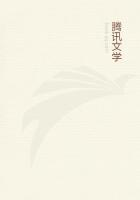The important point in Leibnitz's philosophy is this intellectuality of representation which Leibnitz, however, did not succeed in carrying out; and for the same reason this intellectuality is at the same time infinite multiplicity, which has remained absolutely independent, because this intellectuality has not been able to obtain mastery over the One. The separation in the Notion, which proceeds as far as release from itself, or appearance in distinct independence, Leibnitz did not succeed in bringing together into unity. The harmony of these two moments, the course of mental representations and the course of things external, appearing mutually as cause and effect, is not brought by Leibnitz into relation in and for themselves; he therefore lets them fall asunder, although each is passive as regards the other. He moreover considers both of them in one unity, to be sure, but their activity is at the same time not for themselves. Every forward advance becomes therefore incomprehensible when taken by itself, because the course of the representation as through aims in itself, requires this moment of Other-Being or of passivity; and again the connection of cause and effect requires the universal: each however lacks this its other moment. The unity which according to Leibnitz is to be brought about by the pre-established harmony, namely that the determination of the will of man and the outward change harmonize, is therefore brought about by means of another, if not indeed from without, for this other is God. Before God the monads are not to be independent, but ideal and absorbed in Him.
At this point the demand would come in that in God Himself there should be comprehended the required unity of that which before fell asunder; and God has the special privilege of having laid on Him the burden of what cannot be comprehended. The word of God is thus the makeshift which leads to a unity which itself is only hypothetical; for the process of the many out of this unity is not demonstrated. God plays therefore in the later philosophy a far greater part than in the early, because now the comprehension of the absolute opposition of thought and Being is the chief demand. With Leibnitz the extent to which thoughts advance is the extent of the universe; where comprehension ceases, the universe ceases, and God begins: so that later it was even maintained that to be comprehended was derogatory to God, because he was thus degraded into finitude. In that procedure a beginning is made from the determinate, this and that are stated to be necessary;but since in the next place the unity of these moments is not comprehended, it is transferred to God. God is therefore, as it were, the waste channel into which all contradictions flow: Leibnitz's Théodicée is just a popular summing up such as this. There are, nevertheless, all manner of evasions to be searched out - in the opposition of God's justice and mercy, that the one tempers the other; how the fore-knowledge of God and human ******* are compatible - all manner of syntheses which never come to the root of the matter nor show both sides to be moments.
These are the main moments of Leibnitz's philosophy. It is a metaphysic which starts from a narrow determination of the understanding, namely, from absolute multiplicity, so that connection can only be grasped as continuity. Thereby absolute unity is certainly set aside, but all the same it is presupposed; and the association of individuals with one another is to be explained only in this way, that it is God who determines the harmony in the changes of individuals. This is an artificial system, which is founded on a category of the understanding, that of the absoluteness of abstract individuality. What is of importance in Leibnitz lies in the maxims, in the principle of individuality and the maxim of indistinguishability.
1. La vie de Mr. Leibnitz par Mr. le Chevalier de Jaucourt (Essais de Théodicée, par Leibnitz, Amsterdam, 1747, T. I.), pp. 1-28, 45, 59-62, 66-74, 77-80, 87-92, 110-116, 148-151;Brucker. Hist. crit. phil., T. IV. P. II. pp. 335-368; Leibnitzii Opera omnia (ed. Dutens), T. II., PI. pp. 45, 46.
2. Vie de Mr. Leibnitz, pp. 134-143; Brucker. Hist. crit. philos. T. IV. P. II. pp. 385, 389;Tennemann, vol. xi. pp. 181, 182.
3. Leibnitzii Opera, T. II. P. I. pp. 32-39.
4. Ibidem, Principia philosophi?, pp. 20-31.
5. cf. Leibnitz: Essais de Théodicée, T. I. P. I. § 10, p. 86.
6. Leibnitz: Principes de la nature et la grace, § 1, p. 32 (Recueil de diverses pièces par Des-Maiseaux, T. II. p. 485); Principia philosophi?, § 1, 2, p. 20.
7. Leibnitzii De ipsa natura sive de vi insita actionibusque creaturarum (Oper. T. II. P. II.), § 11, p. 55, Principia philosophi?, § 3-6, 18, pp. 20-22; Principes de la nature et de la grace, § 2, p.
32.
8. Leibnitzii Principa philosophi?, § 7, p. 21; Troisième éclaircissement du système de la communication des substances (Oper. T. II. P. I.), p. 73 (Recueil, T. II, p. 402).
9. Leibnitzii Principia philosophi?, § 8, 9, p. 21; Oper. T. II. P. I. pp. 128, 129, § 4, 5: Il n'y a point deux individus indiscrenables. Un gentilhomme d'esprit de mes amis, en parlant avec moi en présence de Mad. l'Electrice dans le jardin de Herrenhausen, crut qu'il trouverait bien deux feuilles entièrement semblables. Mad. l'Electrice l'en défia, et il court longtemps en vain pour en chercher. Deux gouttes d'eau ou de lait regardées par le microscope se trouveront discernables.
C'est un argument contre les Atomes (Recueil, T. I. p. 50).-Cf. Hegel's Werke, Vol. IV. p. 45.
10. Leibnitzii Principia philosophi?, § 10-16, pp. 21, 22; Principes de la nature et de la grace, §2, p. 32.
11. Leibnitzii Principia philosophi?, § 19-23, pp. 22, 23; Principes de la nature et de la grace, §4, pp. 33, 34; Nouveaux essais sur l'entendement humain (?uvres philosophiques de Leibnitz par Raspe), Bk. II. chap. ix. § 4, p. 90.
12. Leibnitzii De amina brutorum (Op. T. II. P. I.), § 2-4, pp. 230, 231.














